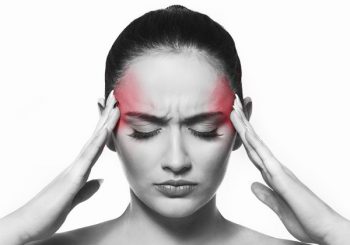Guest Writer for Wake Up World
Have you ever had a migraine headache?
If so, you’re not alone; a staggering 1 in 7 people suffers from migraines, making migraine the third most common diagnosis in the world.1 Almost 25% of young women report at least one migraine in the past 3 months.2
Anyone who’s had a migraine knows how debilitating they are. These headaches can entail throbbing pain, sensitivity to light and sound, and the inability to think clearly. An intense migraine can derail your work and social life, making even the friendliest interactions unbearable. As such, severe headaches are the fourth-highest reason for Emergency Room visits.3 And scarily, a 2010 study showed that 35% of migraineurs who went to the ER were given potentially addictive opioids.4
Because the mind, body, and spirit co-experience health and illness, it is no surprise that those who suffer from migraines (called ‘migraineurs’) are more likely to be diagnosed with depression.5 Further, migraineurs have higher rates of diabetes, myocardial infarction, and even stroke.6
What causes migraines?
According to WebMD, the causes of migraines remain elusive, but they are often attributed to faulty genetics. WebMD goes on to list migraine triggers that include stress, food additives like MSG,7 weather changes, caffeine, and having your period. Indeed, elimination diets, in which people avoid common food triggers, can be effective treatments for migraines.
In one study, 87% of migraineurs became headache-free after completing a 5-day elimination diet, removing oral contraceptives, wheat, tea and coffee, chocolate, milk, and corn.8 Studies have also shown that artificial sweeteners, such as aspartame9 and sucralose (Splenda),10 trigger migraines.
Similarly, nutrient deficiencies11 and high levels of heavy metals12 are linked to migraines. Notably, people who are deficient in magnesium13 and Vitamin D 14 are more likely to suffer from migraines.
Is there anything you can do to prevent or treat migraines?
Migraines are most commonly treated with drugs. Usually, people suffering from migraines take pain relievers, including over-the-counter drugs Tylenol and ibuprofen (Advil/Motrin). Triptans, which are available as pills, patches, sprays, or injections, are another popular intervention strategy. Triptans bind to the serotonin receptor to constrict blood vessels in your brain.15 Some of the more extreme migraine drugs include opioids like codeine, steroids like prednisone, anticonvulsants, antidepressants, and beta blockers.16 All of these drugs come with a formidable portfolio of side effects, ranging from addiction to – paradoxically – migraines.
Beyond drugs, other medical interventions for migraines include injecting Botox (Onabotulinumtoxin A) into 31 places on your head and neck17 and surgical removal brain tissue.18 Additionally, some migraineurs opt for deep brain stimulation, in which parts of your brain and vagus nerve are stimulated by electrical pulses, either by an external machine or by implanted electrodes.19
Do the treatments sound worse than the disease?
If so, I’m glad to tell you that there are interventions with side effects that are actually side benefits!
Research shows that lifestyle changes can alleviate migraines. Specifically, people who remove headache triggers like gluten20 and dairy,21 detox from heavy metals,22 incorporate mindfulness practices23, and add in specific supplements can be freed from migraines. Several studies show that supplementing with magnesium decreases migraine frequency and severity,24 25 even better than strong NSAIDs.26 Similarly, research shows that addressing B-vitamin deficiencies can cure migraines.27 28 29
Dietary and lifestyle practices like this are the bedrock of a holistic clinical practice. As we now understand that depression is a symptom of chronic inflammation, not a chemical imbalance, it follows that lifestyle interventions are the highest yield treatments. To help more people than I could accommodate in my office, I digitized my comprehensive diet and meditation prescription, creating the Vital Mind Reset. No longer relying on prescription drugs, people instead take control of their health by changing the way they live. I continue to be amazed by the strength and recovery stories of people who have committed to this program. Listen to your body, respond to the call, and heal yourself today.
References:
- 1 https://www.migrainetrust.org/about-migraine/migraine-what-is-it/facts-figures/
- 2 https://www.ncbi.nlm.nih.gov/pubmed/2560071
- 3 https://www.ncbi.nlm.nih.gov/pubmed/25600719
- 4 https://www.ncbi.nlm.nih.gov/pubmed/25600719
- 5 https://www.ncbi.nlm.nih.gov/pubmed/28467957
- 6 http://www.neurology.org/content/74/8/628.short
- 7 https://www.ncbi.nlm.nih.gov/pmc/articles/PMC3606962/
- 8 https://www.ncbi.nlm.nih.gov/pubmed/87628
- 9 https://www.ncbi.nlm.nih.gov/pubmed/18627677
- 10 https://www.ncbi.nlm.nih.gov/pubmed/16942478
- 11 https://www.ncbi.nlm.nih.gov/pubmed/10767394
- 12 https://www.ncbi.nlm.nih.gov/pubmed/
- 13 https://www.ncbi.nlm.nih.gov/pubmed/21983373
- 14 https://www.ncbi.nlm.nih.gov/pubmed/28470754
- 15 http://www.webmd.com/migraines-headaches/triptans-serotonin-receptor-agonists-for-migraine-headaches
- 16 http://www.mayoclinic.org/diseases-conditions/migraine-headache/diagnosis-treatment/dxc-20202471
- 17 https://www.ncbi.nlm.nih.gov/pmc/articles/PMC5404453/
- 18 http://journals.lww.com/plasreconsurg/Abstract/2009/08000/A_Placebo_Controlled_Surgical_Trial_of_the.15.aspx
- 19 http://www.sciencedirect.com/science/article/pii/S1474442206705750
- 20 https://www.ncbi.nlm.nih.gov/pubmed/12650798
- 21 https://www.ncbi.nlm.nih.gov/pubmed/27714637
- 22 https://www.ncbi.nlm.nih.gov/pubmed/19515125
- 23 https://www.ncbi.nlm.nih.gov/pubmed/25041058
- 24 https://www.ncbi.nlm.nih.gov/pubmed/12786918
- 25 https://www.ncbi.nlm.nih.gov/pubmed/12786918
- 26 https://www.ncbi.nlm.nih.gov/pubmed/28286809
- 27 https://www.ncbi.nlm.nih.gov/pubmed/12934790
- 28 https://www.ncbi.nlm.nih.gov/pubmed/9484373
- 29 https://www.ncbi.nlm.nih.gov/pubmed/19384265
Originally published at kellybroganmd.com and reproduced here with permission.
Recommended articles by Kelly Brogan, M.D.
- Adverse Effects of Antipsychotic Drugs in Children
- Your Microbiome on Drugs
- Oops! The Brain DOES Have An Immune System
- Is Your Prescription Drug Causing Your Depression?
- Contraception Depression: Can the Pill Affect Your Mood?
- A Time for Rain: Teaching Our Children About Sadness
- Psychobiotics: Bacteria for Your Brain?
- Vitamin B12 Deficiency: A Trigger for Depression and Anxiety?
- The Violence-Inducing Effects of Psychiatric Medication
- Fear Is The Sickness
About the author:
Kelly Brogan, M.D. is a holistic women’s health psychiatrist, author of the NY Times Bestselling book, A Mind of Your Own, the children’s book A Time For Rain, and co-editor of the landmark textbook, Integrative Therapies for Depression. She completed her psychiatric training and fellowship at NYU Medical Center after graduating from Cornell University Medical College, and has a B.S. from M.I.T. in Systems Neuroscience. She is board certified in psychiatry, psychosomatic medicine, and integrative holistic medicine, and is specialized in a root-cause resolution approach to psychiatric syndromes and symptoms. She is on the board of GreenMedInfo, Price-Pottenger Nutrition Foundation, Functional Medicine University, Pathways to Family Wellness, Mindd Foundation, SXSW Wellness, Chickasaw Nation Wellness, and the peer-reviewed, indexed journal Alternative Therapies in Health and Medicine. She is Medical Director for Fearless Parent and a founding member of Health Freedom Action. She is a certified KRI Kundalini Yoga teacher and a mother of two. For more articles, sign up for her newsletter at kellybroganmd.com.

If you've ever found value in our articles, we'd greatly appreciate your support by purchasing Mindful Meditation Techniques for Kids - A Practical Guide for Adults to Empower Kids with the Gift of Inner Peace and Resilience for Life.
In the spirit of mindfulness, we encourage you to choose the paperback version. Delve into its pages away from screen glare and notifications, allowing yourself to fully immerse in the transformative practices within. The physical book enriches the learning process and serves as a tangible commitment to mindfulness, easily shared among family and friends.
Over the past few years, Wake Up World has faced significant online censorship, impacting our financial ability to stay online. Instead of soliciting donations, we're exploring win-win solutions with our readers to remain financially viable. Moving into book publishing, we hope to secure ongoing funds to continue our mission. With over 8,500 articles published in the past 13 years, we are committed to keeping our content free and accessible to everyone, without resorting to a paywall.








